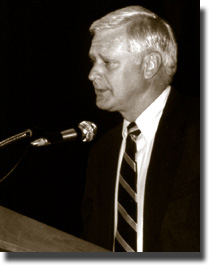Coming to a medical school that didn't exist
meant Wallace Wooles was going to have to sing for his supper.
![]() For
about three years that's what he did, combining typical dean's tasks like
building a curriculum, hiring faculty and planning for the future, with nonstop
lobbying for the school to materialize.
For
about three years that's what he did, combining typical dean's tasks like
building a curriculum, hiring faculty and planning for the future, with nonstop
lobbying for the school to materialize.
He spoke to small crowds in eastern towns, winning people to the idea that
they deserved better medical care. Further west, he worked among the General
Assembly, where the struggle for a medical school largely took place.
![]() "We
thought we had a popular issue," Wooles says. In the end, sincerity and
the strength of his appeal won. He remembers the day he spoke to the legislature's
powerful appropriations committee. Chris Fordham, UNC-Chapel Hill's dean,
spoke first on the reasons ECU should not have a medical school, supporting
his position with an elaborate display.
"We
thought we had a popular issue," Wooles says. In the end, sincerity and
the strength of his appeal won. He remembers the day he spoke to the legislature's
powerful appropriations committee. Chris Fordham, UNC-Chapel Hill's dean,
spoke first on the reasons ECU should not have a medical school, supporting
his position with an elaborate display.
![]() "Dr.
Fordham had eight or 10 people who would get up and give pieces of a presentation
and I was sitting there all by myself," Wooles says. Wooles had no slides,
charts or graphs.
"Dr.
Fordham had eight or 10 people who would get up and give pieces of a presentation
and I was sitting there all by myself," Wooles says. Wooles had no slides,
charts or graphs.
![]() "I
had nothing," he remembers. "I said, 'All I can ask is, 'How many
of you can see a doctor anytime you want to? That is what we're trying to
do.' I said, 'You can put more money into Chapel Hill and it isn't going to
get any doctors down here.' They recognized that and really, I was very well
received."
"I
had nothing," he remembers. "I said, 'All I can ask is, 'How many
of you can see a doctor anytime you want to? That is what we're trying to
do.' I said, 'You can put more money into Chapel Hill and it isn't going to
get any doctors down here.' They recognized that and really, I was very well
received."
![]() The
underdog's role proved good for the hospital.
The
underdog's role proved good for the hospital.
![]() "When
the decision was made to create a medical school, the hospital and its planners
recognized that it couldn't stay a community hospital," he says. "It
had to grow to become what it is today, a tertiary hospital. It had to change
drastically in its thinking and actions, and they have done it very, very
well."
"When
the decision was made to create a medical school, the hospital and its planners
recognized that it couldn't stay a community hospital," he says. "It
had to grow to become what it is today, a tertiary hospital. It had to change
drastically in its thinking and actions, and they have done it very, very
well."
![]() The
benefits were hard won. Every Saturday, he and Dr. Edwin Monroe, also a lobbyist,
counted their supporters. "When the bill was passed putting $25 million
into the school, we knew in advance that we had all the votes," he remembers.
The
benefits were hard won. Every Saturday, he and Dr. Edwin Monroe, also a lobbyist,
counted their supporters. "When the bill was passed putting $25 million
into the school, we knew in advance that we had all the votes," he remembers.
![]() Once
the money flowed in, the hospital began expanding. Bed towers, office space
and other resources such as advanced surgical equipment were changing the
soul of Pitt Memorial.
Once
the money flowed in, the hospital began expanding. Bed towers, office space
and other resources such as advanced surgical equipment were changing the
soul of Pitt Memorial.
![]() "The
medical school brought in permanent physicians who knew the most modern, up-to-date
scientific medicines," he says. "The public has benefited markedly
from these services. The medical school benefited because we have a teaching
outlet."
"The
medical school brought in permanent physicians who knew the most modern, up-to-date
scientific medicines," he says. "The public has benefited markedly
from these services. The medical school benefited because we have a teaching
outlet."
![]() Once
the struggle ended, Wooles became chairman of the Department of Pharmacology,
a position he retired from in 2000.
Once
the struggle ended, Wooles became chairman of the Department of Pharmacology,
a position he retired from in 2000.
![]() He
imagines the medical school growing in the next few years to include a schools
of dentistry and pharmacy. "I think it's a distinct possibility."
He
imagines the medical school growing in the next few years to include a schools
of dentistry and pharmacy. "I think it's a distinct possibility."

Wallace Wooles, Ph. D.
The Brody School of Medicine at East Carolina University
600 Moye Boulevard
Greenville, North Carolina 27858-4354
P 252.744.2240 l F 252.744.2672